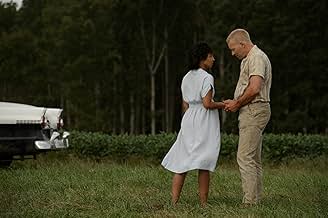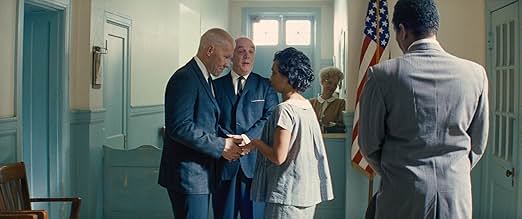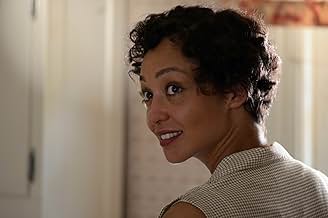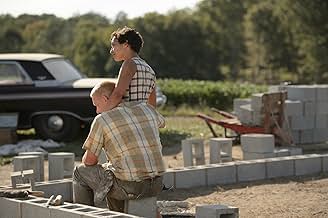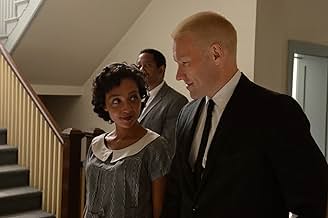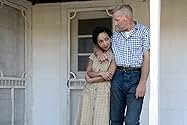CALIFICACIÓN DE IMDb
7.0/10
38 k
TU CALIFICACIÓN
La historia de Richard y Mildred Loving, una pareja cuyo arresto por matrimonio interracial en la década de los sesenta en Virginia comenzó una batalla legal que terminaría con la histórica ... Leer todoLa historia de Richard y Mildred Loving, una pareja cuyo arresto por matrimonio interracial en la década de los sesenta en Virginia comenzó una batalla legal que terminaría con la histórica decisión de 1967 de la Corte Suprema.La historia de Richard y Mildred Loving, una pareja cuyo arresto por matrimonio interracial en la década de los sesenta en Virginia comenzó una batalla legal que terminaría con la histórica decisión de 1967 de la Corte Suprema.
- Nominado a 1 premio Óscar
- 25 premios ganados y 91 nominaciones en total
Chris Greene
- Percy
- (as Chris R. Greene)
- Dirección
- Guionistas
- Todo el elenco y el equipo
- Producción, taquilla y más en IMDbPro
Opiniones destacadas
Greetings again from the darkness. Imagine you are sound asleep in bed with your significant other. It's the middle of the night. Suddenly, the sheriff and his deputies crash through your bedroom door with pistols drawn and flashlights blinding you. You are both taken into custody. For most of us, this would be a terrible nightmare. For Mildred and Richard Loving, it was their reality in June of 1958. Their crime was not drug-dealing, child pornography, or treason. Their crime was marriage. Interracial marriage.
Writer/director Jeff Nichols (Mud, Take Shelter) proves again he has a distinct feel and sensitivity for the southern way. There is nothing showy about his style, and in fact, his storytelling is at its most effective in the small, intimate moments he goes quiet where other filmmakers would go big. Rather than an overwrought political statement, Nichols keeps the focus on two people just trying to live their life together.
Joel Edgerton plays Richard Loving, a bricklayer and man of few words. Ruth Negga plays Mildred, a quietly wise and observant woman. Both are outstanding in delivering understated and sincere performances (expect Oscar chatter for Ms. Negga). These are country folks caught up in Virginia's Racial Integrity Act of 1924, though as Richard says, "we aren't bothering anyone". The counterpoint comes from the local Sheriff (an intimidating Martin Csokas) who claims to be enforcing "God's Law".
Nichols never strays far from the 2011 documentary The Loving Story from Nancy Buirski, who is a producer on this film. When the ACLU-assigned young (and green) lawyer Bernard Cohen (played with a dose of goofiness by Nick Kroll) gets involved, we see how the case hinges on public perception and changing social mores. Michael Shannon appears as the Life Magazine photographer who shot the iconic images of the couple at home a spread that presented the Lovings not as an interracial couple, but rather as simply a normal married couple raising their kids.
In 1967, the Supreme Court decision in Loving v. Virginia, unanimously held Virginia's "Racial Integrity Act of 1924" as unconstitutional, putting an end to all miscegenation laws (interracial marriage was still illegal in 15 states at the time). In keeping with the film's direct approach, the Supreme Court case lacks any of the usual courtroom theatrics and is capped with a quietly received phone call to Mildred.
Beautiful camera work from cinematographer Adam Stone complements the spot on setting, costumes and cars which capture the look and feel of the era (over a 10 year period). Nichols forsakes the crowd-rallying moments or even the police brutality of today's headlines, but that doesn't mean there is any shortage of paranoia or constant concern. We feel the strain through these genuine people as though we are there with them. The simplicity of Richard and Mildred belies the complexity of the issue, and is summed up through the words of Mildred, "He took care of me."
Writer/director Jeff Nichols (Mud, Take Shelter) proves again he has a distinct feel and sensitivity for the southern way. There is nothing showy about his style, and in fact, his storytelling is at its most effective in the small, intimate moments he goes quiet where other filmmakers would go big. Rather than an overwrought political statement, Nichols keeps the focus on two people just trying to live their life together.
Joel Edgerton plays Richard Loving, a bricklayer and man of few words. Ruth Negga plays Mildred, a quietly wise and observant woman. Both are outstanding in delivering understated and sincere performances (expect Oscar chatter for Ms. Negga). These are country folks caught up in Virginia's Racial Integrity Act of 1924, though as Richard says, "we aren't bothering anyone". The counterpoint comes from the local Sheriff (an intimidating Martin Csokas) who claims to be enforcing "God's Law".
Nichols never strays far from the 2011 documentary The Loving Story from Nancy Buirski, who is a producer on this film. When the ACLU-assigned young (and green) lawyer Bernard Cohen (played with a dose of goofiness by Nick Kroll) gets involved, we see how the case hinges on public perception and changing social mores. Michael Shannon appears as the Life Magazine photographer who shot the iconic images of the couple at home a spread that presented the Lovings not as an interracial couple, but rather as simply a normal married couple raising their kids.
In 1967, the Supreme Court decision in Loving v. Virginia, unanimously held Virginia's "Racial Integrity Act of 1924" as unconstitutional, putting an end to all miscegenation laws (interracial marriage was still illegal in 15 states at the time). In keeping with the film's direct approach, the Supreme Court case lacks any of the usual courtroom theatrics and is capped with a quietly received phone call to Mildred.
Beautiful camera work from cinematographer Adam Stone complements the spot on setting, costumes and cars which capture the look and feel of the era (over a 10 year period). Nichols forsakes the crowd-rallying moments or even the police brutality of today's headlines, but that doesn't mean there is any shortage of paranoia or constant concern. We feel the strain through these genuine people as though we are there with them. The simplicity of Richard and Mildred belies the complexity of the issue, and is summed up through the words of Mildred, "He took care of me."
'Loving' was outstanding. I know I review a lot of films that star a person people I love, but this film was one of the best ones I saw this year (Moonlight. GO SEE IT). I hesitated even writing that, thinking it couldn't be true, but it was. I was emotionally vested, riveted and compelled by it. Jeff Nichols' did a beautiful job directing this film in its fantastic simplicity, allowing Ruth Negga and Joel Edgerton to deliver stellar performances as Mildred & Richard Loving. Joel Edgerton specifically stood out to me as I was a fan of his since King Arthur with Clive Owen (love Clive to death, but it was bad) and I absolutely love seeing him on film. He was remarkable as Richard Loving, communicating so much with his eyes and body language, I think it was a role that challenged him and I appreciate the impeccable job he did. Equally talented, Ruth Negga was also outstanding as Mildred Loving. She communicated so much just through her eyes! She is a very talented young woman who will have one outstanding career ahead of her. Marton Csokas and Michael Shannon make short but memorable appearances, honesty though both men are superbly talented so it's a real treat to have them pop up in smaller roles. Fun fact: Jeff Nichols directed Michael Shannon in another film I really liked, "Take Shelter".
This film is about two people in love, an understated but very deep love which altered the very course of American history. 'Loving' begins in the late 1950s, right when racial tension was at its highest, just as the Civil Rights Movement was gaining momentum. Compounded by this and social pressures from within their community, the Lovings were forced to live in fear and even meet under cover of night. No one should have to live like this, ever. Nichols did a wonderful job of illustrating just how much this impacted their lives. How this couple, who only wanted to have a family and be together in peace, lived in a persistent state of paranoia fearing violence or worse just because they loved each other. It really is beyond all comprehension, that a black woman and a white male would be violating law simply being married. That tune sounds very familiar doesn't it, when likened to present day? All those lovely gay couples who can't hold hands just because they are scared that you are unable to mind your own damn business. Such a shame.
'Loving' is also about hope. The beautiful glory of hope and love. Even despite everything, all the adversity and hardship there is always hope. That was one thing I really took away from the film. When asked how she is able to keep fighting, Mildred Loving, played by the wonderful Ruth Negga, says: Well, you loose the small battles to win the big war." This film is also about freedom, liberty and rights. This is the land of the free after all, but only free if you're not black, or gay, or anything not considered the status quo. The Lovings fought for years tooth and nail for the right to be able to love each other and raise a family the poignant part of this film to me is the ridiculous fact that they had to endure years of crap for something they should've had all along.
Overall the film was just wonderful, I was moved and felt it in a very real way. The story is palpable from many perspectives which I think was a pretty challenging feat for Nichols accomplish, but he did so with efficacy. The narrative is clear: Love is love, live and let live. I say go see it, fall in love and carry it with you.
This film is about two people in love, an understated but very deep love which altered the very course of American history. 'Loving' begins in the late 1950s, right when racial tension was at its highest, just as the Civil Rights Movement was gaining momentum. Compounded by this and social pressures from within their community, the Lovings were forced to live in fear and even meet under cover of night. No one should have to live like this, ever. Nichols did a wonderful job of illustrating just how much this impacted their lives. How this couple, who only wanted to have a family and be together in peace, lived in a persistent state of paranoia fearing violence or worse just because they loved each other. It really is beyond all comprehension, that a black woman and a white male would be violating law simply being married. That tune sounds very familiar doesn't it, when likened to present day? All those lovely gay couples who can't hold hands just because they are scared that you are unable to mind your own damn business. Such a shame.
'Loving' is also about hope. The beautiful glory of hope and love. Even despite everything, all the adversity and hardship there is always hope. That was one thing I really took away from the film. When asked how she is able to keep fighting, Mildred Loving, played by the wonderful Ruth Negga, says: Well, you loose the small battles to win the big war." This film is also about freedom, liberty and rights. This is the land of the free after all, but only free if you're not black, or gay, or anything not considered the status quo. The Lovings fought for years tooth and nail for the right to be able to love each other and raise a family the poignant part of this film to me is the ridiculous fact that they had to endure years of crap for something they should've had all along.
Overall the film was just wonderful, I was moved and felt it in a very real way. The story is palpable from many perspectives which I think was a pretty challenging feat for Nichols accomplish, but he did so with efficacy. The narrative is clear: Love is love, live and let live. I say go see it, fall in love and carry it with you.
I'm very conflicted on how I feel about this. On one hand, I very much appreciated just how restrained and quiet this film turned out to be. It could have easily turned into a completely sentimental, over-saturated melodrama in the vein of The Help and it didn't. However, I also feel like it could have been more effective than it was. It also very much felt like Nichols was kind of on stand-by. I'm not sure if it was the mix of the period drama subject matter with someone like him as a director that made it feel a lot quieter than most films of this type, but I wanted to feel more than I did, I wanted more passion out of it. It's still a solid film and I'll see how it fares in my mind with time, but for now I say it was somewhat of a disappointment. I do think quieter films like this fare better with me the more I think about it, so I'm hopeful I'll like it a little more later on. Both Edgerton and Negga were really lovely, but I really don't see them getting nominated for an Oscar. I just think if a film is like this, the AMPAS will want something "bigger", both by the film and its actors and I just think in general everything here is way too subdued for them. It was great seeing Negga in a role so unlike her other one in Preacher and I can't wait to see more of her.
Unfortunately, I think the movie itself just doesn't work and isn't overly interesting. I can appreciate a slow movie, as long as it builds to something worthwhile. With Loving, it's slow and there's no overarching momentum. There's no fluidity. It just inches along through a collection of scenes. And these scenes end up being incredibly repetitive. Not only do we see the characters doing a lot of the same things they were doing before, but a lot of information is repeated over and over. Scenes happen that give us no new information, or repeat what we learned from an earlier scene. It's not just that some scenes needed to be cut, the entire film needed to be restructured. As it stands right now, there's no connective tissue making this a cohesive film. It's just scene after scene. And yes, there is an endgame, but it's glossed over and trivialized in the scheme of the entirety of the movie. There was just nothing captivating about this movie, nothing really reeling me in...
A few weeks ago when I reviewed "Hidden Figures" I pointed out the how absurd the racist behaviour at NASA in the 60's must have appeared to a young boy in the audience at my screening. In many ways, "Loving" – a film that has had a lot less publicity and is a less obvious 'crowd-pleaser' – makes a useful companion piece to that film.
It tells the true story (yes, yet ANOTHER 'true story'!) of Richard and Mildred Loving who travelled from their home town of Central Point Virginia to Washington DC where – as a mixed race couple – they could legally get married.
However, on returning to their home state and living together as man and wife, they fell foul of the State's repulsive antimiscegenation statute which banned inter-racial marriages. The Lovings were found guilty and sentenced to a year in jail, which was suspended on the requirement that – unbelievable but true – the couple leave Virginia and not return (together) for 25 years. The film documents the fight of the couple – largely led by the feisty Mildred (Ruth Negga) – to fight the injustice, taking the case ultimately to the US Supreme Court for an historic ruling.
This was an Oscar-nominated performance by Ruth Negga and, man, is it deserved. It's a performance of such quiet understated power that it is a joy to watch. But also strong is that of Joel Egerton ("Midnight Special", "The Great Gatsby") as Richard who here adopts a largely sulky and subservient manner that contrasts beautifully with Negga's perky optimism.
I also loved the performance of Marton Csokas (Celeborn from "The Lord of the Rings"), chillingly unreasonable as the bigoted Sheriff Brooks and Michael Shannon ("Nocturnal Animals", "Midnight Special") as the Time photographer Grey Villet, capturing a classic picture that is shown (in standard 'true story' fashion) at the end of the film (and below).
Written and directed by Jeff Nichols, whose "Midnight Special" last year made my top 10 of the year, this is a thoughtful and educational piece that should particularly appeal to older viewers keen to see a drama of historical importance beautifully told.
(For the graphical version of this review please visit bob-the-movie- man.com. Thanks.)
It tells the true story (yes, yet ANOTHER 'true story'!) of Richard and Mildred Loving who travelled from their home town of Central Point Virginia to Washington DC where – as a mixed race couple – they could legally get married.
However, on returning to their home state and living together as man and wife, they fell foul of the State's repulsive antimiscegenation statute which banned inter-racial marriages. The Lovings were found guilty and sentenced to a year in jail, which was suspended on the requirement that – unbelievable but true – the couple leave Virginia and not return (together) for 25 years. The film documents the fight of the couple – largely led by the feisty Mildred (Ruth Negga) – to fight the injustice, taking the case ultimately to the US Supreme Court for an historic ruling.
This was an Oscar-nominated performance by Ruth Negga and, man, is it deserved. It's a performance of such quiet understated power that it is a joy to watch. But also strong is that of Joel Egerton ("Midnight Special", "The Great Gatsby") as Richard who here adopts a largely sulky and subservient manner that contrasts beautifully with Negga's perky optimism.
I also loved the performance of Marton Csokas (Celeborn from "The Lord of the Rings"), chillingly unreasonable as the bigoted Sheriff Brooks and Michael Shannon ("Nocturnal Animals", "Midnight Special") as the Time photographer Grey Villet, capturing a classic picture that is shown (in standard 'true story' fashion) at the end of the film (and below).
Written and directed by Jeff Nichols, whose "Midnight Special" last year made my top 10 of the year, this is a thoughtful and educational piece that should particularly appeal to older viewers keen to see a drama of historical importance beautifully told.
(For the graphical version of this review please visit bob-the-movie- man.com. Thanks.)
¿Sabías que…?
- TriviaThe production filmed outside the actual Virginia jail where the couple had been incarcerated, and inside the actual courthouse where they had pleaded guilty to the 'crime' of being married.
- ErroresThere's a scene where Mildred Loving is shown washing dishes at home, and the dinnerware appears to be made of Corelle. This brand of dinnerware was not introduced until 1970, and the scene in question would have been mid to late Sixties.
- Citas
Richard Loving: [from trailer] Tell the judge I love my wife.
- Bandas sonorasOoh! My Head
Written and Performed by Ritchie Valens
Published by Sony/ATV
by arrangement with Sony Music Licensing and Warner Tamberlane Music
Courtesy of Rhino Entertainment Company
By arrangement with Warner Music Group Film & TV Licensing
Selecciones populares
Inicia sesión para calificar y agrega a la lista de videos para obtener recomendaciones personalizadas
- How long is Loving?Con tecnología de Alexa
Detalles
- Fecha de lanzamiento
- Países de origen
- Idioma
- También se conoce como
- Loving
- Locaciones de filmación
- Lawrenceville Airport in Lawrenceville, Virginia, Estados Unidos(as Richmond Dragway)
- Productoras
- Ver más créditos de la compañía en IMDbPro
Taquilla
- Presupuesto
- USD 9,000,000 (estimado)
- Total en EE. UU. y Canadá
- USD 7,751,969
- Fin de semana de estreno en EE. UU. y Canadá
- USD 159,615
- 6 nov 2016
- Total a nivel mundial
- USD 12,957,265
- Tiempo de ejecución2 horas 3 minutos
- Color
- Relación de aspecto
- 2.39 : 1
Contribuir a esta página
Sugiere una edición o agrega el contenido que falta

Principales brechas de datos
By what name was El matrimonio Loving (2016) officially released in India in Hindi?
Responda






